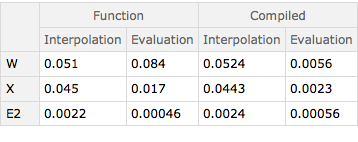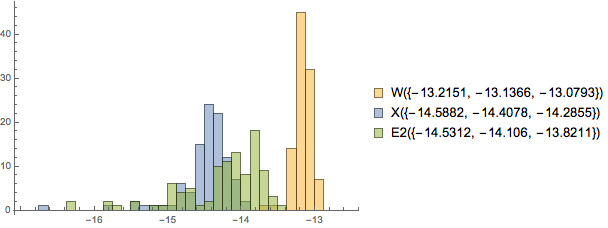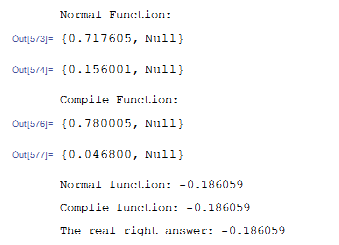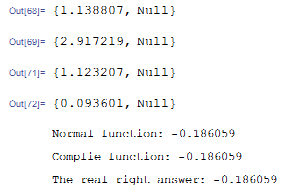Overview
I have a function that acts like the Interpolation on sparse $n$-dimensional data using a simple implementation of RBF interpolation method. I want my function to return a compiled function that will run fast. What I get works but it is much slower that I think it should be.
My code
Clear[RBFInterpolation]
Options[RBFInterpolation] = {
"DistanceFunction" -> (Norm[#1 - #2] &),
"RadialBasisFunction" -> (Sqrt[#1^2 + #2^2/4] &),
"RadialScale" -> Automatic, "Debug" -> False, "Compile" -> False};
RBFInterpolation[cptab_, opts : OptionsPattern[RBFInterpolation]] :=
Module[
{ro, xpts, fundata, Φ, disfun, λ, RBF, x},
xpts = #[[1]] & /@ cptab;
fundata = #[[2]] & /@ cptab;
disfun = OptionValue["DistanceFunction"];
RBF = OptionValue["RadialBasisFunction"];
Φ =
Table[disfun[xpts[[i]], xpts[[j]]], {i, 1, Length[xpts]},{j,1,Length[xpts]}];
Which[
OptionValue["RadialScale"] == Automatic,
ro = Median[
Flatten[Table[
Drop[Φ[[i]], {i}], {i, 1,
Length[Φ]}]]],
NumberQ[OptionValue["RadialScale"]],
ro = OptionValue["RadialScale"],
True,
Print["I cannot understand \"RadialScale\"->",
OptionValue["RadialScale"], " So I'm going to make it up"];
ro = Median[
Flatten[Table[
Drop[Φ[[i]], {i}], {i, 1, Length[Φ]}]]]
];
If[OptionValue["Debug"], Print["ro=", ro]];
If[OptionValue["Debug"],
Print["Distance function on first two points"];
Print["point 1 ->", xpts[[1]]];
Print["point 2 ->", xpts[[2]]];
Print["Distance ->", disfun[xpts[[1]], xpts[[2]]]];
Print["Radial Basis Function on Distance ->",
RBF[disfun[xpts[[1]], xpts[[2]]], ro]]
];
Φ = Map[RBF[#, ro] &, Φ, {2}];
If[OptionValue["Debug"],
Print["Element of Φ[[1,1]]=", Φ[[1,1]]]];
λ = Inverse[Φ].fundata;
If[OptionValue["Debug"],
Print["First element of λ[[1]]=", λ[[i]]]];
If[OptionValue["Compile"],
Return[
With[{xi = x, λi = λ, xptsi = xpts, roi = ro},
Compile[{{xi, _Real, 1}},
Sum[λi[[i]] RBF[disfun[xi, xptsi[[i]]], roi], {i, 1,
Length[λ]}]]]],
Return[
Function[x,
Sum[λ[[i]] RBF[disfun[x, xpts[[i]]], ro], {i, 1,
Length[λ]}]]]
]
];
Most of this function is not of interest to my question. I think the key is where I Return[] the compiled function.
Return[
With[{xi = x, λi = λ, xptsi = xpts, roi = ro},
Compile[{{xi, _Real, 1}},
Sum[λi[[i]] RBF[disfun[xi, xptsi[[i]]], roi], {i, 1,
Length[λ]}]]]]
Testing the Function
The following code can be used to run and test the timing of the returned function.
First make a "Truth" function to sample then interpolate
Clear[truth]
truth[x_] := Product[Sin[x[[i]]], {i, 1, Length[x]}];
Make up some data
n = 100;
d = 5;
cpts = RandomReal[{-π/2, π/2}, {n, d}];
cptab = {#, truth[#]} & /@ cpts;
xpts = #[[1]] & /@ cptab;
fundata = #[[2]] & /@ cptab;
Test the speed of the returned functions
Print["Normal Function:"];
Timing[funFun = RBFInterpolation[cptab, "Compile" -> False];]
Timing[funFun[#] & /@ xpts;]
Print["Compile Function:"];
Timing[funFunc = RBFInterpolation[cptab, "Compile" -> True];]
Timing[funFunc[#] & /@ xpts;]
i = 1;
Print["Normal function: ", funFun[xpts[[i]]]];
Print["Complie function: ", funFunc[xpts[[i]]]];
Print["The real right answer: ", fundata[[i]]];
I get results like this:
Normal Function:
{0.080987,Null}
{0.123981,Null}
Compile Function:
{0.092986,Null}
{0.156977,Null}
Normal function: -0.0182901
Complie function: -0.0182901
The real right answer: -0.0182901
So as you can see it works but it is not faster. How do I make this faster?
Simpler test that is faster!?
The code:
n = 10;
a = RandomReal[{-1, 1}, n];
f = Table[2 π i, {i, 1, n}];
ϕ = RandomReal[{0, 2 π}, n];
Clear[Nfun]
Nfun[t_] := Sum[a[[i]] Cos[f[[i]] t + ϕ[[i]]], {i, 1, n}];
Nfunc = Compile[{{t, _Real}},
Evaluate[Sum[a[[i]] Cos[f[[i]] t + ϕ[[i]]], {i, 1, n}]]];
Clear[makeNfunc]
makeNfunc[a_, f_, ϕ_] := Module[{n},
n = Length[a];
Return[
Compile[{{t, _Real}},
Evaluate[Sum[a[[i]] Cos[f[[i]] t + ϕ[[i]]], {i, 1, n}]]]]
];
NfuncR = makeNfunc[a, f, ϕ];
Run the code:
npts = 10000;
data = RandomReal[{0, 10}, npts];
Timing[Nfun[#] & /@ data;]
Timing[Nfunc[#] & /@ data;]
Timing[NfuncR[#] & /@ data;]
The output:
{0.585911, Null}
{0.012998, Null}
{0.012998, Null}
So in this simple case the compiled code is about 45 times faster for both the function compiled inline Nfunc and the function that was returned by the makeNfunc, NfuncR
So the question is what is the problem with my original function above?






Compilehas been improved since version 7, which I use, but when I run the lineTiming[funFunc[#] & /@ xpts;]I getCompiledFunction::cfte: Compiled expression 0.` should be a rank 1 tensor of machine-size real numbers. >> CompiledFunction::cfex: Could not complete external evaluation at instruction 20; proceeding with uncompiled evaluation. >>Do you see similar errors? $\endgroup$rankwhich gave me similar errors. I then found that 1 worked which makes since becausexiis a vector. I get no indication that what is returned is not compiled, like the error textproceeding with uncompiled evaluation.implies. If I just evaluatefunFuncI getCompiledFunction[...stuff..]as expected. Everything works it is just no faster. $\endgroup$CompilationOptions -> {"InlineExternalDefinitions" -> True}will fix your problem. $\endgroup$